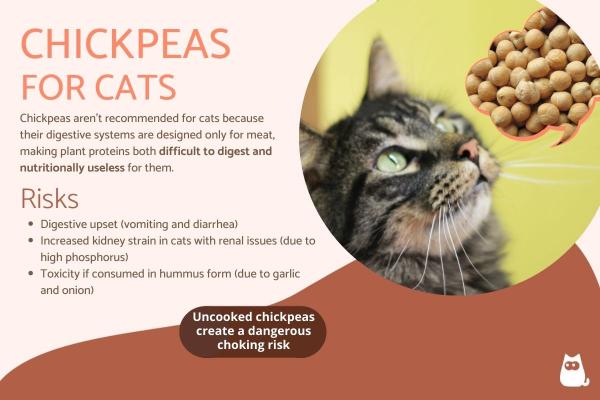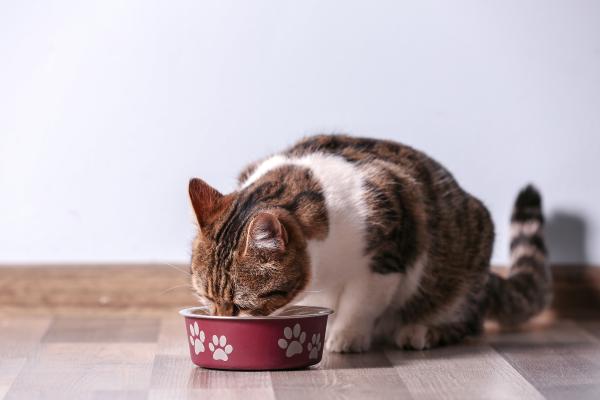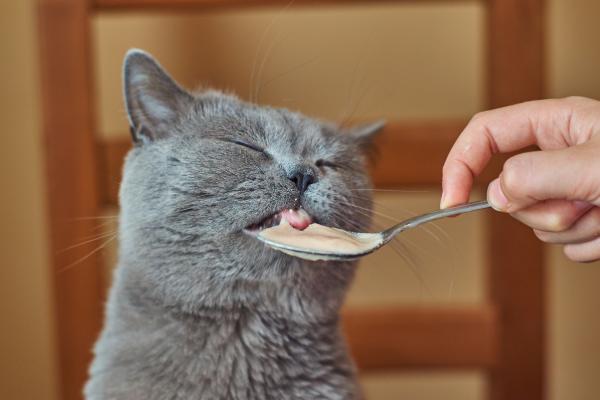Can Cats Have Chickpeas?



See files for Cats
While chickpeas have been a valuable food source for humans since pre-Neolithic times, they aren't suitable for our feline companions. As obligate carnivores, cats have evolved to thrive on a meat-based diet, making their nutritional needs fundamentally different from ours. Many cat owners wonder about feeding chickpeas to their pets, especially given these legumes' reputation as a healthy protein source for humans.
This AnimalWised article explores if chickpeas are safe for cats, what to watch for if your cat accidentally eats them, and what to feed instead.
Are chickpeas good for cats?
Your cat isn't just a picky eater, they're built differently from us. Cats are what we call obligate carnivores, which means they must eat meat to survive. Their entire digestive system is designed to handle a meat-based diet.
Why aren't chickpeas a good fit for cats? First, cats simply don't have the right digestive tools to handle plant foods like chickpeas. They lack the enzymes needed to properly break down plant proteins and carbohydrates. This means that eating chickpeas can upset their stomach and cause digestive problems.
Even though chickpeas are packed with protein, it's not the right kind for cats. Cats need specific amino acids found only in meat.
Can cats eat hummus?
Hummus is even more problematic for cats than plain chickpeas. Many common hummus ingredients, like garlic and onion, are actually toxic to cats. Plus, processed chickpea products often contain additives and seasonings that could make your cat sick. Best to keep the hummus for yourself and give your cat proper cat treats instead.
Benefits of chickpeas for cats
The simple truth is that chickpeas offer no real benefits for cats. While chickpeas are often touted as beneficial because they contain fiber, protein, and various nutrients, cats can't properly utilize these nutrients from plant sources.
Some sources claim chickpeas could help with weight control or blood sugar regulation in cats because of their fiber content. However, these claims come from applying human nutrition science to cats, which doesn't work. Cats regulate their metabolism differently, and their digestive systems aren't designed to process plant fiber effectively.
If you're looking to help your cat with weight management or blood sugar control, it's better to:
- Consult with your veterinarian for proper dietary advice.
- Use portion-controlled servings of high-quality cat food.
- Choose cat-specific treats designed for their nutritional needs.
Remember, just because a food is healthy for humans doesn't mean it benefits cats. Their bodies are specialized for a meat-based diet, and that's where they should get their nutrition from.
Curious about what cats actually need in their diet? Our nutrition guide explores everything your feline friend should be eating.

How to give chickpeas to my cat?
While we don't recommend feeding chickpeas to cats, if your cat has shown interest in them, here's what you need to know about safer consumption:
The safest form would be plain, thoroughly cooked chickpeas without any seasonings, oils, or additives. Raw chickpeas contain harmful compounds that cooking helps neutralize.
Also, make sure to remove the outer skin to reduce digestive issues and choking risks.
If your cat has already eaten chickpeas, monitor them for signs of digestive upset such as vomiting, diarrhea, or changes in appetite. While an occasional chickpea likely won't cause serious harm, there's no nutritional reason to deliberately add them to your cat's diet.
Amount of chickpeas for cats
Even small amounts of chickpeas can upset a cat's digestive system, potentially causing stomach discomfort, loose stools, or vomiting.
While the occasional chickpea probably won't harm your cat, there's simply no benefit to including them in your cat's diet. If you want to give your cat treats, stick to commercial cat treats or small bits of plain cooked meat instead.
Wondering what foods are actually good for your cat? Discover our comprehensive guide to feline nutrition.

Side effects of chickpeas for cats
When cats eat chickpeas, they may experience several health issues. The most immediate concern is digestive upset, cats often develop stomach problems, vomiting, and diarrhea after eating chickpeas, especially in larger amounts.
Beyond immediate digestive issues, relying on chickpeas (or any plant proteins) as a significant protein source can lead to serious nutritional deficiencies in cats. This is because cats specifically need taurine and arachidonic acid, which are essential nutrients found only in animal proteins. Without these vital compounds, cats can develop serious health problems affecting their heart, vision, and overall well-being.
Signs to watch for after chickpea consumption include:
- Digestive upset (vomiting, diarrhea)
- Loss of appetite
- Lethargy
- Changes in bathroom habits
If you notice any of these symptoms after your cat eats chickpeas, monitor them closely and contact your veterinarian if the symptoms persist or worsen.

Contraindications of chickpeas for cats
While chickpeas aren't generally recommended for any cats, they can be particularly problematic for cats with certain health conditions:
Cats with kidney disease should never eat chickpeas. The high phosphorus content in chickpeas can worsen kidney problems, potentially accelerating the progression of kidney failure. In cats with compromised kidney function, maintaining proper mineral balance is crucial, and even small amounts of high-phosphorus foods can cause problems.
Cats with digestive sensitivities or gastrointestinal conditions are also at higher risk. Any existing digestive issues can be aggravated by chickpeas, potentially triggering severe reactions in cats with inflammatory bowel disease, sensitive stomachs, or other gastrointestinal conditions.
If your cat has any ongoing health issues, always consult your veterinarian before introducing any new foods to their diet. They can provide guidance specific to your cat's health needs and recommend appropriate treats or dietary adjustments.
Concerned about your cat's diet and health? Explore our comprehensive guide on managing feline kidney stones.
If you want to read similar articles to Can Cats Have Chickpeas?, we recommend you visit our Homemade diets category.
- ASPCA. (n.d.). People foods to avoid feeding your pets. American Society for the Prevention of Cruelty to Animals. Retrieved January 28, 2025, from https://www.aspca.org/pet-care/animal-poison-control/people-foods-avoid-feeding-your-pets
- Catster. (n.d.). Can cats eat chickpeas?. Retrieved January 28, 2025, from https://www.catster.com/nutrition/can-cats-eat-chickpeas
- PetMD. (n.d.). Can cats eat beans?. Retrieved January 28, 2025, from https://www.petmd.com








